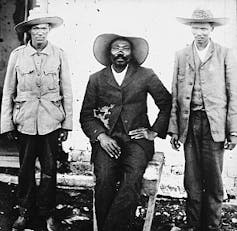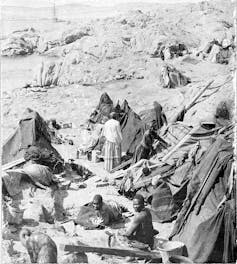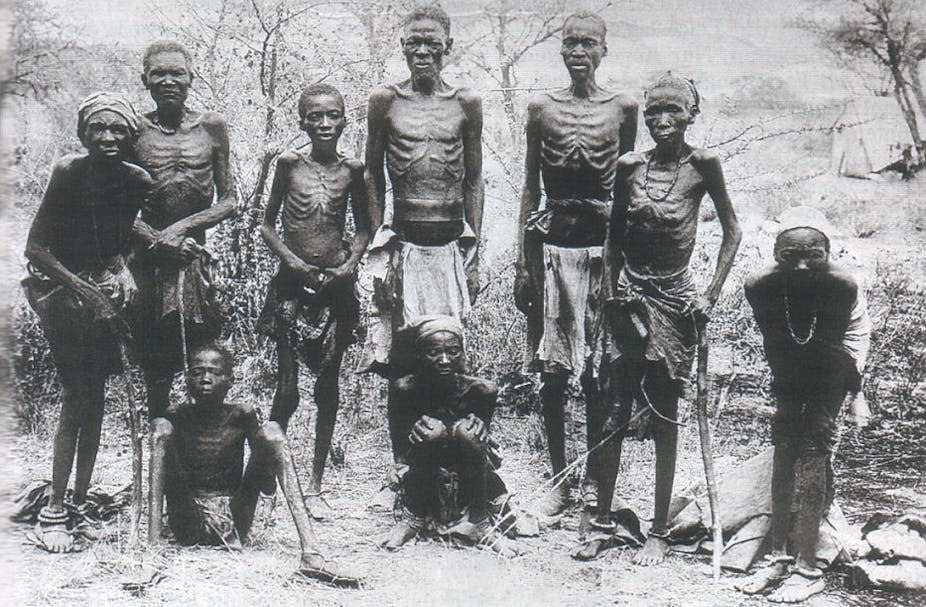More than a century ago, on 26 September 1905, in a remote and isolated part of German Southwest Africa (present day Namibia) a young Australian lay dying amid the sand dunes and salt pans.
Lured across the border on the pretext of buying some cattle, he was shot by two Boers in German employ and left for dead. The next morning a German patrol visited the scene and delivered the coup de grâce.
Today, Edward Presgrave is a forgotten name in Australia and Namibia, but his support for the Nama uprising and for one of its most successful and charismatic leaders, Jakob Morengo, deserves our attention. Move over Breaker Morant, here is a story about a real Australian hero – one who enlisted and fought in two irregular regiments in the Boer War aged only 18; who after the war stayed on in the Cape Colony to supply, support and fight alongside legendary freedom fighter Jakob Morengo in his epic guerrilla war against the German military forces.
It is a story marked with adventure, heroism, self-sacrifice, deception and betrayal and one that ends in tragedy for both Presgrave and Morengo.
It is also a story that touches on many of the major themes that dominate Namibia and the Cape’s early colonial history. The native uprisings against the Germans largely involved the Herero and Nama nations in the years between 1903 and 1907. Presgrave played a small part in these uprisings, acting as a “secretary” to Morengo, supplying him with arms and ammunition, and fighting alongside him in a handful of engagements with the Germans.
These native uprisings were not minor affairs. By the time the war was over the death toll far exceeded that of the Boer War. The conflict and its aftermath had a catastrophic impact on the Herero and Nama nations.
Before the war the Herero nation had numbered around 80,000 and the Nama approximately 20,000 people. Within five years there were barely 15,000 Herero and 9,500 Nama left. Many of the deaths had taken place in the network of concentration and work camps established by the Germans where physical abuse, rape, malnutrition, scurvy, medical experimentation and death were common. For some it was a forerunner of what was to come in Europe just 35 years later.

Jakob Morengo was without any doubt one of the real heroes of the Nama struggle against German colonialism in the early part of the 20th century.
From mid-1904 he conducted a highly successful guerrilla war against the Germans and for more than two years held down 15,000 well equipped German troops with only a handful of followers. His grasp of hit-and-run guerrilla tactics stands comparison with the best Boer exponents of the craft. He was also noted for his intelligence, humanity and concern for others, be they Nama, Herero or German. He fought for what he believed in with resilience and courage against incredible odds showing extraordinary bravery, perseverance and success.
Why Presgrave allied himself to Morengo’s cause is not known, but perhaps it was a search for adventure, a desire to support the underdog or a firm belief in what the Herero and Nama were fighting for. Certainly, Presgrave was something of an adventurer who liked excitement and the good life and the lure of the frontier. In 1905 he is said to have lived among the Nama for some months in the remote Karasberge mountains and taken photographs of Morengo’s supporters. Regrettably, none have survived.
We know very little about Presgrave’s life. Born in England, he emigrated to Australia with his parents in 1887. The family finally settled in Hurstville, Sydney, where his father (also Edward) took up employment as a stationer. Early in 1900, Edward, accompanied by his father, made their own way to Cape Town, where young Edward enlisted in Brabants Horse and later The Scottish Horse, with whom he saw fighting against the Boers near the border of Basutoland and the Orange River Colony and later south of Johannesburg.
After serving for six months he was discharged only to enlist in the Marquis of Tullibardine’s Scottish Horse a few days later. With this regiment he saw fighting against the Boers in the rugged terrain of the Magaliesberg Mountains. Presgrave does not seem to have distinguished himself in either regiment and won no promotion beyond that of Trooper. Despite this, according to a letter his father wrote to the British Colonial Office, he was “a good soldier and a favourite amongst the men and his officers”.
When he was honourably discharged in September 1901, Presgrave, like so many other Australians, elected to remain in the Cape Colony, ultimately making his way up to the Northern part of the Cape and settling in the town of Upington near the Orange River and the border with German Southwest Africa. Here, according to his father he established himself as a “contractor”. In the following years Presgrave continued to live in and around Upington and trade in cattle and other supplies. With the advent of the Nama rebellion he allied himself closely to a number of local families supportive of the rebels. By the beginning of 1905 he was actively supporting Jakob Morengo and supplying him with arms and ammunition.
There is little doubt that Presgrave’s support for Morengo attracted the attention of both the German and the British authorities and that there were many who would have been pleased to see the back of him. There is also little doubt that the local German military authorities planned his capture by paying two Boer mercenaries to entice him over the border on the pretence of buying some cattle. Once across the border they attempted to capture him but when he resisted shot him a number of times in the stomach. Left to die, Presgrave was finally killed the following morning when a German patrol discovered him lying in the sand dunes. Two years later - almost to the day - Jakob Morengo would also meet his death, this time at the hands of the Cape Mounted Police.

The circumstances of Presgrave’s tragic death became something of a cause célèbre between the British, Cape and German governments. In Australia, his mother had waged a spirited campaign to obtain the details of his death and to seek compensation from the German Government for what she believed was her son’s unlawful killing.
Enlisting the support of the Governor of NSW - and totally bypassing the Australian government - she petitioned the British Colonial Office to seek further information from the German government. Over the next five years Presgrave’s father also conducted a campaign to obtain more information about his son’s death writing numerous letters to the British Colonial Office and the Cape government.
For 14 months the “Presgrave Affair” rumbled on, with the Cape government also pressing the British Colonial and Foreign Offices to pursue the matter with the German government. This ultimately led to a prolonged exchange of diplomatic notes between London and Berlin. Interestingly, not one word of this reached Australia until the British government had finally washed its hands of the matter and formally declared that Presgrave’s death was “justified” insofar as he had been actively supporting the rebels in German territory.
It was only when Lord Elgin in the Colonial Office formally wrote to Mrs Presgrave to inform her of the above and the Governor of NSW forwarded a copy to the Prime Minister’s Office that the Australian government became aware of the matter. To their credit, the Australian Prime Minister Alfred Deakin and Attorney-General Littleton Groom pressed for more information about Presgrave’s death, but by then it was too late as the British Government regarded the Presgrave Affair as closed. For many, however, Presgrave’s death remained an “official killing”, hard to distinguish from murder.
Edward Presgrave’s story is one that is mired in tragedy. The tragedy of the Herero and Nama peoples in the years after 1903, the tragedy of Jakob Morengo and his supporters, the tragedy of the failed colony of German Southwest Africa, and of a young Australian cut down in his prime. But there seems little doubt that Presgrave deserves to be remembered and honoured. He was a young man who struggled against the odds for something he believed in. If heroes include those who embrace causes and struggle against overwhelming odds with courage, fortitude and determination, then he was certainly cast in the heroic mould. He should not be forgotten.
Peter Curson is the author of a recently released book entitled “Border Conflicts in a German African Colony: Jakob Morengo and the Untold Tragedy of Edward Presgrave”, published by Arena Books.

